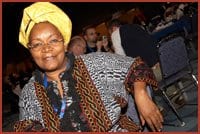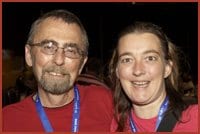
DISPARITIES AFFECTED THE CONFERENCE. Alice Nkom, a lawyer defending nine Cameroonians jailed for homosexuality. Credit: Pat Croteau
MONTREAL. In a diverse world, equality comes first. That was the message heard in plenary discussions, workshops and conversations at the International Conference on LGBT Human Rights in Montreal from Jul 26 to 29.
The conference, which preceded the first World Outgames, brought activists and academics together to discuss oppression against lesbian, gay, bisexual and transgender people around the world. The resulting discussion — shared by over 2,000 people from more than 100 countries — brought many to tears and spontaneous applause. For many attendants — some of whom come from countries where homosexuality is still an offence punishable by torture or death — the conference represents a rare opportunity to band together with like-minded activists committed to the cause, without fear of reprisals.
Louise Arbour, UN High Commissioner for Human Rights and former Canadian Supreme Court justice, opened the conference Jul 26 by slamming national governments for allowing violence against queer people to go undocumented and unreported.
“Neither the existence of national laws, nor the prevalence of custom can ever justify the abuse, attacks, torture and indeed killings that gay, lesbian, bisexual and transgender persons are subjected to because of who they are or are perceived to be,” says Arbour. “Rarely does it provoke public debate and outrage. This shameful silence is the ultimate rejection of the fundamental principle of universality of rights.”
Breaking the silence was a recurring theme of the conference — the need for people to stand up in their homes and communities, and for activists, particularly in the First World, to support the struggles of people living in places with inadequate and discriminatory laws. But some presenters also point the finger at the Canadian government, criticizing Stephen Harper’s Conservatives for attempting to turn back the clock on queer rights, particularly in relation to same-sex marriage. They also speak in support of the international activists — including 20 people from Cameroon — who were unable to attend the conference because they were denied entry into Canada for not having “fixed employment.”
This, according to South African judge Edwin Cameron, only serves to highlight the difficulties that queer people in poor countries face on a day-to-day basis. Cameron, who is openly gay and HIV-positive, is credited with persuading the South African government to enshrine sexual orientation as a protected ground in the country’s constitution. He jokes that the conference could have been titled the “First World” Outgames, pointing out the sea of white faces in the crowd.
“Over 80 percent of the lesbian, gay, bisexual and transgender people in the world live in Africa, Asia or Latin America,” says Cameron. “Their lives are often characterized by poverty, disease and dislocation.
“Those disparities have intruded on this conference. The criteria that you need to have fixed employment to get into Canada for a conference such as this, means that most gay and lesbian activists outside the affluent world would never gain entry to it. In my view, that is a most regrettable and deplorable situation.”
Other speakers at the conference draw links between the queer rights movement, and other movements for social and political change.
Kim Gandy, the president of the National Organization Of Women (NOW), underscores the need for women and queer people to work together, particularly in the US, where the Bush administration continues to attack reproductive rights as well as sexual freedom.
“We need to be allies in this fight,” she says, pointing out that the 2003 US Supreme Court decision in Lawrence versus Texas that overturned the country’s remaining sodomy laws, hinges on the same principle of the right to privacy as Roe v Wade, the 1973 case that lifted the US ban on abortion.
In 1971, NOW was the first US women’s organization to take the position that “lesbian rights are women’s rights,” and in 1995 the group was the first to refuse to endorse any political candidate that didn’t support same-sex marriage.
“Equality is the capacity for each of us in our own right to make a difference in our communities,” says Gandy. “Change does not happen in isolation.”
The conference closed on a high note, with the adoption of the Declaration of Montreal, a statement that will be presented to the UN and to national governments. The hope is that national and international politicians will put a stop to discrimination against queer and trans people around the world. The declaration calls for the elimination of sodomy laws, demands that queer people be given the right to free assembly and be included in the fight against HIV/AIDS. It demands that national governments grant asylum to people who are being persecuted based on their sexual orientation or gender identity, that queer relationships be granted the same legal rights as heterosexual relationships, and that our human rights be placed on the agenda of the newly formed UN Human Rights Council.
Tennis star and lesbian icon Martina Navratilova closed the conference, urging participants to continue their fight for queer rights and social justice. She offered these words of advice to people who are new to queer activism, “Play to win. Tell the truth, and most of all, come out.”


 Why you can trust Xtra
Why you can trust Xtra


